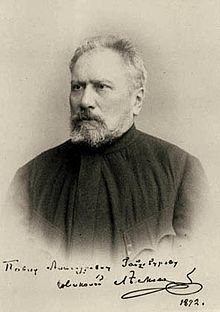Old times in Plodomassowo
Old Times in Plodomassowo ( Russian Старые годы в селе Плодомасове , Staryje gody w sele Plodomassowe ) is a novel by the Russian writer Nikolai Leskow . The fragment consists of three sketches. These were published in 1869; the first two in the literary magazine Syn otetschestwa and the rest in Russki Westnik .
Leskov wrote on January 20, 1888 in the Novoye Vremya , a model for his protagonist who Bojar in Marfa Andrewna be, the landowner Nastassja Sergejewna, nee Princess Masalski from the district Kromy in Oryol Governorate been.
content
The big old church village Plodomassowo lies in the middle of deep forests on the bank of the fast Turiza - a tributary of the Volga . In the fall of 1748, born in 1697 wealthy rides Boyar Nikita Yuryevich Plodomassow on one of his forays into the plenty of his home village two hundred versts distant little village Sakromy one. The boyar behaves like a robber captain. The rabble in his bodyguard is also out for outrage. Nikita stays in the house of the village owner - the impoverished nobleman Andrei Baizurov. The almost 50-year-old uninvited guest falls in love with Marfa, the fifteen-year-old daughter of the host. The next day Nikita asked the parents for the daughter's hand and was turned down, also because of the age difference. The boyar steals Marfa and rides home to Plodomassowo with the "booty". The parents immediately go into pursuit. The mother Pelageia Baizurowa pursues the kidnapper. Andrei Baizurov's father hurries into town; wants to sue the governor against the robber. Too late - the noblewoman Marfa, still a girl in the evening, was forcibly married at midnight and a housewife in the early morning.
Finally the governor personally visits Nikita's manor in Plodomassowo with an overpowering force and confronts Marfa. She replies: "... I was really married to him, but not by force." The comment of the mother Pelageja Baizurova, who has since arrived: "... women of our sex never testify against their husbands."
Leskov writes about Marfa: "The prisoner had defeated her kidnapper ..." and from then on rules Plodomassowo, because Nikita, the "tamed madhead", has given in forever and ever.
After fifteen years of marriage, Alexei, the couple's only child, is born. Nikita dies. Marfa rules over three thousand serf peasants.
At the age of 15, Marfa sent her son to the residence. After five years in Petersburg , Alexej is lieutenant in the guard when 50-year-old Marfa puts on her old woman's cap at home in Plodomassowo. Alexej, at home on vacation for a year, impregnates Marfa's maid. The enraged grandmother-to-be has the sad hero whipped and makes it clear: “Whoever gets involved with servants will also be punished in servant fashion.” The boyaress sends the son back to Katharina's bodyguard regiment and is reconciled with the maid. Both tailors baby clothes together.
The secret robber captain Vanka Shornow, officially a servant of the boyarin, raids the estate at night with "boiled executioners" and tortures Marfa. The boyarin holds out, but the maid has a premature birth and dies after the nocturnal excitement. The grandson is alive. Marfa appoints the little nobleman Parmen - not his father Alexej - as heir.
reception
- 1959: Setschkareff is reminded of Walter Scott after reading the first sketch and reads the second as a character study of the boy girl Marfa Andrewna.
- 1975: Reissner notes that Leskov was writing about the Orjol governorate, an area in which he grew up. The author mentions a parallel: Leskov's aunt Natalja Petrovna Alferjewa was - in 1824 still half a child - married to the 50-year-old wealthy landowner MA Strachow and then harassed by him.
literature
German-language editions
Output used:
- Old times in Plodomassowo. Translated from the Russian by Günter Dalitz. P. 403–506 in Eberhard Reissner (Ed.): Nikolai Leskow: Collected works in individual volumes. The clergy. 807 pages. Rütten & Loening, Berlin 1975 (1st edition)
Secondary literature
- Vsevolod Sechkareff : NS Leskov. His life and his work. 170 pages. Verlag Otto Harrassowitz, Wiesbaden 1959
Web links
- The text
- Entry in the Laboratory of Fantastics (Russian)
- Entries in WorldCat
Individual evidence
- ^ Reissner in the follow-up to the edition used, p. 777, 6. Zvo
- ↑ Reissner in the follow-up to the edition used, p. 777, 8. Zvu as well as Russian Примечания ( Memento of November 8, 2011 in the Internet Archive ) - Notes
- ↑ Russian Плодомасово
- ↑ Russian Турица
- ↑ Edition used, p. 406, 14. Zvo and 18. Zvo
- ↑ Russian Закромы
- ↑ Edition used, p. 435, 23. Zvo
- ↑ Edition used, p. 436, 5th Zvu
- ↑ Edition used, p. 437, 9. Zvo
- ↑ Edition used, p. 451, 13. Zvu
- ↑ Edition used, p. 455, 16. Zvo and p. 456, 15. Zvu
- ↑ Edition used, p. 474, 11. Zvu
- ↑ Setschkareff, p. 73, 9. Zvu
- ^ Reissner in the follow-up to the edition used, p. 777 middle
